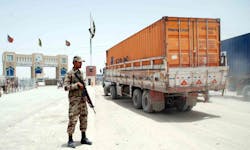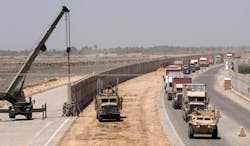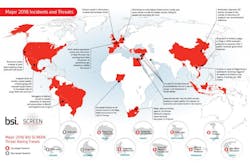It’s perhaps appropriate as we head into the Memorial Day weekend – a holiday established to reflect upon the sacrifices made to protect our country – to think about just some of the many ongoing threats facing the transportation and logistics industry.
To that end, BSI Supply Chain Services and Solutions – a division of BSI (which stands for “British Standards Institution”) – crafts a report every year that analyzes global “trouble spots” specifically for supply chain operations.
These are places where issues such as labor strikes, attempted coup d'états, refugee migration, terrorism and, yes, cargo theft, make the movement of cargo an even more dangerous and tricky business than it normally is.
[Don’t think everyday freight moves are dangerous? Then check this video out.]
BSI’s Global Supply Chain Intelligence Report for 2016 lays out a range of security, social responsibility, and business continuity risks that are stalking freight operations in many parts of the world – with cargo theft the predominant issue in both North and South America.
Indeed, here in the U.S., Memorial Day weekend is one of the most popular times for cargo theft, according to data gathered by research firm CargoNet, with 98 cargo thefts reported during this particular weekend over the past four years. In contrast to non-holiday weekends, cargo thefts at a 40% higher rate during the Memorial Day holiday period.
Yet “supply chain risks” encompass just more than stealing freight.
BSI noted in its report that the European migrant crisis is perhaps the best example of a type of event that began as a single security risk then built into what the firm calls a “business continuity disruption” as countries imposed border controls, which in turn was exacerbated by blocked migrants looking for work and often falling victim to forced labor in certain nations.
“As risks, such as the migrant crisis, continue to evolve, it's imperative that organizations work together to take a holistic risk management approach to ensure they are informed and prepared to address multiple areas of concern,” BSI noted.
So let’s take a look at some of the threats that faced supply chains across the globe in 2016, according to BSI’s region-by-region analysis, and how those threats will increase, decrease, or shift during the course of 2017.In Asia, BSI observed a shift in labor strike threats in China last year, driven mainly by concerted government efforts to limit strikes in the country following years of increasing labor disruption.
Labor strikes still occurred in large numbers across China last year, but the number of strikes dropped in 2016 for the first time in recent years, the firm said, with strikes at factories dropping by 31%.
Overall, two-thirds of China’s provinces – including major apparel, consumer goods, and electronics production hubs – witnessed a decline in manufacturing strikes.
However, BSI stressed that “an emerging area of concern” is the growth in strikes in the logistics sector, including trucking, shipment processing, and delivery, which rose more than fourfold from nine incidents in 2014 to 40 in 2016.
That’s ugly stuff, to put it mildly.
In Europe, BSI’s threat analysis – not surprisingly – centers of terrorism. Europe experienced significant terrorist attacks in Nice, France, last July, followed by an attack in Berlin, Germany, last December – all occurring alongside dozens of counterterrorism arrests made across the continent during 2016.
Those two attacks in particular also underscored the threat that terrorists will exploit the supply chain to perpetrate attacks, BSI stressed.
In both cases, Tunisian men linked to the Islamic State in Iraq and Syria (ISIS) used cargo trucks to ram into crowds of civilians. The Berlin attacker even perpetrated an explicit disruption of the supply chain before the attack by hijacking a Polish tractor-trailer carrying a shipment of steel beams, the firm noted.
ISIS-linked plots involving similar timing and tactics are likely to continue challenging European security into 2017, BSI warned.
Then there’s the supply chain worry caused by government unrest as illustrated by the failed coup d'état launched in Turkey by a faction of the Turkish armed forces against the reigning Justice and Development Party (AKP) government and President Recep Tayyip Erdoğan on July 15 last year.
That failed coup led to significant security and business continuity impacts, both short and long term, as the Turkish government initiated widespread purges of numerous departments and agencies across virtually every ministry, as well as the military, police, and intelligence services.
There have been over 100,000 officials removed from public duty, 70,000 investigated and 32,000 arrested in total since that failed overthrow attempt, BSI noted.
Finally, the Americas, where cargo theft remains a major supply chain concern – especially in South America, where the most dramatic increase in cargo theft rates for 2016 occurred in Rio de Janeiro, Brazil.
Already the second largest hotspot for cargo theft in the country, officials in Rio de Janeiro reported a total of 9,870 cargo theft incidents in 2016; some 36% more incidents than those recorded in the state in 2015, BSI said.
The year-over-year increase in cargo theft incidents in both Rio de Janeiro and nearby Sao Paulo, combined with minimal efforts to curb the rate of theft, suggests that Brazil could see another year of increased cargo theft in 2017.
Overall, BSI emphasized that the threats facing supply chain operations are not expected to lessen as 2017 progresses.
The firm pointed out in its report that cargo theft and drug smuggling in the Americas and Europe, protests over wage and other labor issues across Asia, and persistent risks of terrorism, including terrorists targeting supply chain operations, will remain ongoing and highly dangerous issues for freight operators to face.
Not pleasant topics to mull over this holiday weekend, that’s for sure.






